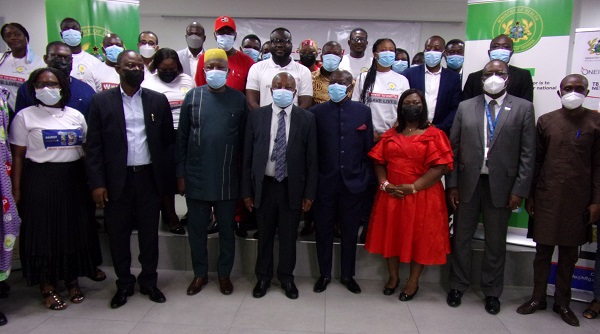
Ghana has in the last five years missed its target to detect at least 44,000 cases of tuberculosis (TB) each year due to inadequate funding.
The result of this is the high mortality rate of TB in the country and transmission of the disease among the populace.
At an event to commemorate this year’s World TB Day on the theme; “Invest to End TB, Save Lives,” the Programme Manager of the National Tuberculosis Programme at the Ghana Health Service (GHS), Dr Yaw Adusi-Poku, said Ghana had a funding gap of 20 million dollars per year to implement its National TB Strategic Plan (2021-2025).
The plan seeks to reduce TB incidence by finding missing cases, cut the mortality rate and decrease the proportion of TB-affected families who suffer catastrophic cost due to the disease by 2025.
Last year, a total of 13,332 TB cases were identified in the country, about 2.7 per cent higher than 2020, where 12,629 cases were recorded.
Additionally, an estimated 10,000 people died of TB in 2020 with 15,000 Ghanaians said to succumb to the disease annually.
According to Dr Adusi-Poku, following a pilot bi-directional testing policy on TB and COVID-19 in 2021, due to similarity in symptoms of both diseases, more TB cases were found in the population than COVID-19.
“Of the suspected COVID-19 cases, there were more TB cases than COVID-19; 13 and 9 per cent respectively. Scaling it up in the last two months of 2021 across all the 16 regions, 472 more cases, contributing 13.5 per cent of the last quarter cases of 500, were detected,” he said.
The Programme Manager appealed to government to procure more GeneXpert cartridges to improve TB case detection across the country as it increases investment in other infrastructure such as digital x-rays, sputum containers, sample transportation system and capacity building, among others.
“Of the 260 districts in the country, GeneXperts are available in only 50 per cent and the rest of the districts need to be covered. We have 55 digital x-rays coming from accelerating TB case detection phase 1 and we plead with the Ministry of Health to fastrack phase 2 of the project which comes with additional 150 digital x-rays with artificial intelligence,” he said.
“With adequate investment in human capital and all other resources required, we can end TB in Ghana as it is planned under the Sustainable Development Goals.”
The World Health Organisation Country Director, Dr Francis Kasolo, said Ghana cannot achieve its United Nations targets on TB by 2030 if current funding gaps were not addressed.
According to him, increased funding for TB would not only sustain gains made in the fight but would alleviate preventable suffering and deaths of people.
“I call on the Ghana government to mobilise additional domestic financial support for TB control beyond Global Fund co-financing commitment. Gaps in TB diagnostics such as GeneXpert cartridges and TB medications should be filled with domestic resources,” he urged.
The Minister of Health, Kwaku Agyeman-Manu, in a speech read on his behalf, expressed government’s commitment to procure enough GeneXpert cartridges to test suspected TB, equip 150 district hospitals with digital x-rays and artificial intelligence for TB diagnosis and furnish the multidrug-resistance (MDR)TB facility at Nsawam in the Eastern region.
“All these investment are geared towards ending TB and saving the lives of our populace and with the support of our external partners we can achieve this,” he stated.
TB is a serious infectious bacterial disease that mainly affects the lungs and spreads through the cough and sneeze of an infected person.
Symptoms usually include a cough (sometimes blood-tinged), weight loss, night sweats and fever.
The disease is curable and can be successfully treated within six months to a year on multiple antibiotics.
BY ABIGAIL ANNOH







